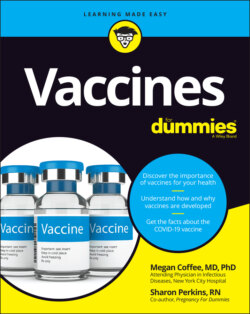Читать книгу Vaccines For Dummies - Sharon Perkins - Страница 10
Distinguishing between antigens and antibodies
ОглавлениеAntigens are what is memorable in the “Wanted” photo. An antigen is something very specific — like that birthmark or tattoo — that can’t be missed. Your immune system uses that very specific marking to create an immune response and memory. This marking is usually a protein or sometimes a sugar on the outside of the pathogen.
Antibodies are what your body makes in response to antigens. After your body has been shown the antigen or “Wanted” photo, you keep a supply of memory immune cells that can make a whole lot more antibodies if the pathogen ever arrives. Specific antibodies go after just one specific antigen. Once that antigen is found again, your body floods it with copies of this antibody from those memory immune cells. The antibodies then attach themselves to their antigens, which are on the outside of the pathogen. The antibodies then stop this specific pathogen, like a virus particle or bacterium cell, from causing any more problems.
It typically takes a few weeks after exposure for the body to produce this response. Vaccination gives you a head start so you already have the ability to make all these antibodies if you need to. With a natural infection, you can get quite sick before you were able to scramble and create an effective immune response.
